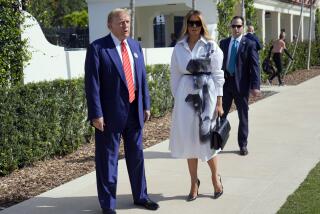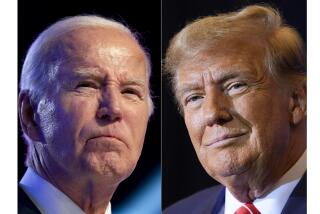Newsletter: Essential Politics: A crucial two weeks on the presidential trail
For both Hillary Clinton and Donald Trump, the chances of winning their parties’ presidential nomination could turn on what happens over the next two weeks.
It’s not that a huge number of delegates will be won in either Nevada or South Carolina. Instead, key propositions about the campaign will be put to a test.
Good afternoon, I’m David Lauter, Washington bureau chief. Welcome to the Friday edition of our Essential Politics newsletter, where we review the state of the presidential campaign and highlight some stories that provide insight beyond the news headlines.
What’s at issue for Clinton in both South Carolina and Nevada is the belief that Sen. Bernie Sanders’ insurgency can be contained to the ranks of white liberals. Both states have large percentages of minority voters — more than half of South Carolina’s Democrats are black, for example, and a significant share of Nevada’s are Latino.
If Sanders can beat Clinton in either state, which would probably mean attracting a large share of younger African Americans and Latinos, he will have completed his transition from protest candidate to plausible nominee. Clinton will go from embattled front-runner to establishment candidate under siege.
“Momentum is a huge deal,” veteran political strategist Bill Carrick told my colleague Kate Linthicum in her preview of the Nevada race. If Sanders wins the Nevada caucuses on Feb. 20, that factor will be clearly on his side.
The need to hold the loyalty of minority voters was one reason why Clinton, in last night’s debate, invoked President Obama‘s name 21 times in two hours. Obama remains extremely popular among black voters, in particular. As Cathleen Decker noted in her analysis of the debate, the president serves as both a sword and shield for his former secretary of State.
Clinton’s tie to Obama is also the theme of a new radio ad aimed at minority voters that the Clinton-allied super PAC, Priorities USA, is starting in South Carolina — the group’s first foray into the primary campaign, a development first reported this morning by the Washington Post.
On the GOP side, the issue is whether the anti-Trump forces in the party, which still make up a majority of its voters, can consolidate behind one candidate before the New York billionaire can amass so many convention delegates that he becomes unstoppable.
That’s why South Carolina looms large in the GOP race, as Noah Bierman and Lisa Mascaro wrote in their preview of the contest.
The two Floridians, Jeb Bush and Sen. Marco Rubio, and Sen. Ted Cruz of Texas all seem headed for a demolition derby which could thin the field but might just leave each of them bruised and less able to take Trump on. The fifth candidate, Ohio Gov. John Kasich, hopes just to get through the pileup and fight on to the Michigan primary on March 8 and other big Midwestern states on March 15.
At the same time, several outside groups, and at least some of the candidates, will be going after Trump. In Iowa, a barrage of anti-Trump ads by Cruz may have been one factor in Trump’s doing worse than polls had projected. By contrast, in New Hampshire, the rest of the field mostly shot at each other, not the front-runner.
The GOP faces a classic version of what economists call a collective action problem. All the other candidates share a goal — beating Trump — that would be furthered if all but one of them were to drop out of the race. But not one of them has an incentive to be the one who sacrifices himself for the greater good.
Trump pulls about 30% to 40% of the GOP vote in most state-by-state polls. In a two-way race, that’s the losing side. But come March, some of the large GOP primaries become winner-take-all, either statewide or by congressional district. If the field remains splintered, Trump could begin amassing large numbers of delegates in a hurry. Half the GOP delegates will have been allocated after votes are counted on March 15.
Before we go, here are a few more pieces by my colleagues that are worth a read over the weekend:
Christi Parsons conducted a revealing interview with Obama in which he talked about race, partisanship and how his life has changed since the days in which he could play poker with Republican colleagues in the Illinois legislature. Check out the full transcript and video of the interview. And for a great read, here’s Christi’s first-person account of covering Obama since his days as a state legislator.
Of all the candidates, Bush is the one who has taken on Trump the most. Doyle McManus wrote an interesting column on Bush finally discovering some passion.
Check out Decker’s anatomy of a Trump rally, a rollicking festival of grievance.
And before New Hampshire recedes full into the rearview mirror, here’s Mark Z. Barabak’s look at the results on the Republican side, and what they mean.
What we’re reading:
Molly Ball, in the Atlantic, consistently provides some of the most interesting analyses of the campaign. For an excellent example of her work, here’s this week’s piece on the ethos of the campus left, which has been key to Sanders’ support among young voters.
Coming up:
With the government closed Monday for the President’s Day holiday, the daily Essential Politics newsletter will return Tuesday morning.
But tomorrow, follow our live coverage of the Republican presidential debate on Trail Guide.
And if you missed any of Thursday night’s Democratic debate, are looking for video or wondering about a key exchange, catch up with last night’s Trail Guide, which was chock full of good material.
As always, keep track of all the developments in the 2016 campaign with our Trail Guide, at our politics page and on Twitter at @latimespolitics.
Send your comments, suggestions and news tips to politics@latimes.com.
More to Read
Get the L.A. Times Politics newsletter
Deeply reported insights into legislation, politics and policy from Sacramento, Washington and beyond. In your inbox three times per week.
You may occasionally receive promotional content from the Los Angeles Times.







